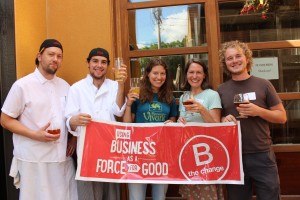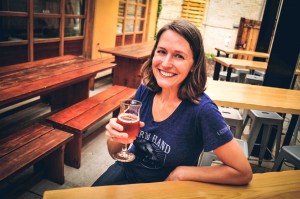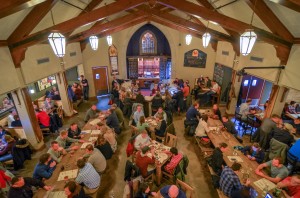Q&A: With climate declaration, Brewery Vivant continues striving to “Beer the Change”

As if making delicious beer wasn’t enough to win us over, America’s craft brewers have also been strong leaders in showing that businesses can thrive while giving back to their communities and finding innovative ways to protect the environment.
Case in point: Two dozen craft brewers announced this week they had signed a Brewer’s Climate Declaration, which says the companies will take action to reduce their greenhouse gas emissions and will engage with policymakers to support political action to halt climate change. Those breweries already are taking steps to reduce energy use, cut transportation emissions and conserve water, among other sustainability measures.
“It’s good for business, it’s not just good for the environment,” Craft Brew Alliance sustainability manager Julia Person told the Huffington Post. “We’re lowering our operating costs. It’s doing the right thing and having a benefit.”
So far, two Michigan companies—Rockford Brewing Company and Brewery Vivant—have signed the declaration.
In reading up about the climate declaration, we were impressed to learn that Brewery Vivant in 2012 became the first brewery in the country to attain LEED certification from the U.S. Green Building Council. We checked in with co-owner and sustainability manager Kris Spaulding to learn more about how the Grand Rapids brewery is striving to support its community and shrink its environmental impact.
MEC: Why did Brewery Vivant decide to sign on to the climate declaration? More generally, why have you made sustainability such a priority?
Kris Spaulding: Sustainability is one of the values we founded our business on. We believe that a great business exists because of the support of the local community. Therefore a business should be an active member of the community and should strive to find meaningful ways to engage with it and give back to it. These are values we hold personally, but that we believe all businesses should be thinking along the lines of the triple bottom line.
As for the declaration itself, climate change is going to continue to impact our industry and our world so I think it is best to work towards solutions now rather than waiting for more catastrophic events to finally lead to change happening. I like that the declaration challenges businesses to innovate and work towards solutions rather wait and see what someone else will do.
MEC: What are some other climate-related sustainability efforts the brewery has undertaken so far?
KS: We use 100 percent renewable electricity from Michigan through Consumers Energy’s Green Generation program. We do a greenhouse gas inventory every year and have a goal (that we have met!) to reduce our CO2 emissions annually. And we completed a life cycle assessment on our FarmHand beer in order to understand what our major impacts are and thus be able to determine how to reduce the carbon footprint of our products.
MEC: Brewery Vivant also seems pretty aware of other aspects of sustainability, like conserving water and locally sourcing (and even growing) your ingredients. Tell us a little about those efforts.
KS: We have a list of 14 sustainability-related goals that we measure ourselves against and report on annually. In fact we’ll launch our 2014 sustainability report, “Beer the change…” on March 17. We have changed the goals a bit over time as we have matured as a business (this is our fifth year) but overall the intent is the same. We set goals looking at how we spend our money, what our impact on the earth and our community is and then we report on it and talk about it to anyone who wants to listen. Our hope is that in being transparent, we will continue to challenge ourselves in new ways, learn from others and inspire others to think about sustainability too.
MEC: Looking forward, what new sustainability-related opportunities and challenges do you see ahead for Brewery Vivant (or for brewers generally)?
KS: For brewers I think climate change specifically is going to increasingly impact our ingredients. We have seen issues with both hops and grain and the scarcity of fresh water is a real problem in the West. We are lucky to have the Great Lakes here to insulate us from that one, but that makes it even more important for us to all work towards protecting our waterways and being mindful of our impact on them.
For Vivant, the next few years will have us continue investigating solar energy with the intent to have onsite solar hot water and local sourcing for our pub and our brewery. We have a garden for the pub that we hope to expand into a small farm in the next few years too. This year we are focusing a lot on our zero waste goal and finding places to recycle or reuse the things in our waste stream that we know still have value but that aren’t picked up by our recycling company. We became a certified B Corporation last year so we are also looking at the assessment as a road map for determining and implementing new practices or policies. B Corporations are a new type of company that have a higher standard of social and environmental performance, transparency, and accountability.
From a bigger-picture perspective, now that we have a few years under our belts, a solid staff and good foundation towards our sustainability goals, I am looking into how Vivant can take that next step towards being a sustainable business. In my mind, the next step is when a business uses its expertise and resources to help solve a societal problem such as homelessness, hunger, prisoner re-entry, or the preservation or clean-up of a local body of water. I’m just starting to think about what could make sense for our business so I don’t have any idea where that thinking will take us, but I’m excited to take our commitment to being a good community member to the next level.
MEC: What is it about brewers that makes so many of them put a premium on environmentally responsible business practices?
KS: I think there are two factors that go into this. One is that we rely so much on fresh water for our product given that beer is mostly water. That dependence gives brewers an appreciation and respect for water and nature that is deeper than many other industries.
The other factor is that most of the people who own and operate craft breweries are pretty focused on the community they are a part of. After all, a pub is traditionally a place where the public gathers. You see a lot of brewers supporting local organizations in cash or in kind through the relationships we build with our customers and our neighbors.
There is also an element of the type of person who opens a craft brewery. Our industry truly is a very friendly one and unlike other industries, we collaborate a lot rather than seeing each other purely as competitors. We openly and eagerly share our best practices with each other and do things together for the common good. A great example is that here in the Grand Rapids area we have all joined together to plant a “Brewer’s Grove” of trees in Riverside Park. Each year we raise money to purchase trees and then all get together to plant them on an October afternoon.
MEC: You’ve got a free afternoon on a perfect summer day for a picnic at your favorite place in Michigan’s great outdoors. Which Brewery Vivant beer do you bring along, and where do you go to enjoy it?
KS: That’s like asking a parent to choose a favorite child! My answer would change depending on what we have available at the time and what we are eating, but odds are, you would find me drinking either our Zaison, which is an imperial saison we brew each spring, or a Big Red Coq, which is a hoppy red ale that I love for the tropical fruit flavors in the hops.
One of my favorite places in Michigan is Saugatuck Dunes State Park. Its beauty is ultimately what led me to stay in Michigan as a young adult rather than moving out east or west. Otherwise, Old Mission Point and the Leelanau Peninsula in the Traverse City area is another favorite and where my soul feels most filled.
###
Photos courtesy Kris Spaulding.






Comments are closed.